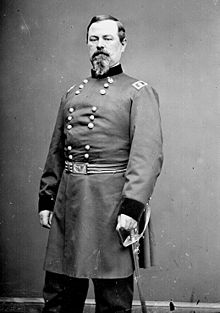Irvin McDowell
Irvin McDowell (born October 15, 1818 in Columbus , Ohio , † May 4, 1885 in San Francisco , California ) was an American officer in the US Army .
Life
McDowell was born in Columbus and later attended College de Troyes in France. In 1838 he graduated from the US Military Academy in West Point , New York as the 23rd of his class and got his first post in the 1st US Artillery Regiment as a lieutenant . He was a lecturer in tactics at West Point for a while before becoming an adjutant to General John E. Wool in the Mexican-American War . He took part as a captain in the Battle of Buena Vista . After the war he continued to serve as an adjutant and was promoted to major in 1856 .
One month after the start of the Civil War , McDowell was promoted to Brigadier General on May 14, 1861 , and was given command of the Army of Northeastern Virginia - actually a large corps force, although he had never before led so many troops as officer in charge in combat. The main reason for the promotion was the influence of its sponsor, Treasury Secretary Salmon P. Chase . Although McDowell knew his troops were unwilling to fight and were inexperienced, Washington politicians urged him to launch a hasty offensive against the Confederate forces in northern Virginia. His plan of operations in the First Battle of the Bull Run , while resourceful, was very complex, so due to their inexperience, his troops were unable to implement it effectively. The result was the defeat and subsequent escape of the army.
After the defeat at Bull Run, Major General McClellan took command of the newly formed Potomac Army . McDowell initially commanded a division in this army . When McClellan reorganized his army the following spring, McDowell became commanding general of the 1st Corps . (With effect from March 14, 1862 he was promoted to major general of the volunteers.) This corps had the task of ensuring the defense of Washington in the hinterland and occasionally supporting McClellan on his peninsula campaign . However, fearful that Confederate General Thomas Jonathan Jackson might attack Washington during his Shenandoah campaign, the nervous Washington politicians increasingly insisted that McDowell's 40,000 soldiers remain near Washington, DC .
Finally, the three independent commands of Generals McDowell, Frémont and Banks were combined into the Virginia Army under the command of Major General John Pope . McDowell was given command of the III. Corps. He was blamed for the disaster in the Second Battle of the Bull Run and escaped military conviction only by testifying against Major General Fitz-John Porter , whom General Pope had charged with obedience. (When Porter was rehabilitated in 1879, McDowell's reputation suffered from being accused of perjury.) Although McDowell had not been formally convicted, he was sidelined by the military for the next two years.
In July 1864 he was in command of the Pacific Defense Area and later in command of the California Military District, the 4th Military District ( Mississippi and Arkansas ) during the Reconstruction and then Commander of the West Military Area. Eventually he was promoted to full major general in 1872; he held this rank until his retirement in 1882. After his death in 1885, McDowell was buried in the San Francisco National Cemetery.
Web links
- Irvin McDowell in the database of Find a Grave (English)
| personal data | |
|---|---|
| SURNAME | McDowell, Irvin |
| BRIEF DESCRIPTION | American Army Officer |
| DATE OF BIRTH | October 15, 1818 |
| PLACE OF BIRTH | Columbus , Ohio |
| DATE OF DEATH | May 4, 1885 |
| Place of death | San Francisco , California |
